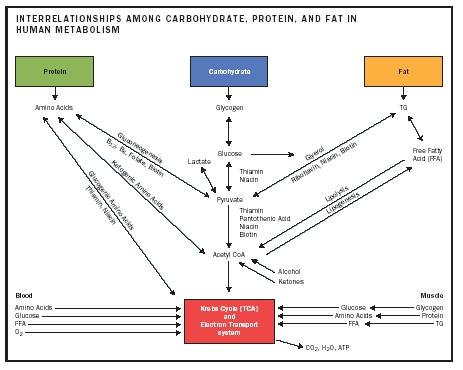Moderators: JeffN, carolve, Heather McDougall
Stella wrote:that humans lacked the ability to convert excess carbs to fat. I think he called it denovolipogenesis or something of the sort.
Stella wrote:I have been following the MWL for almost 4 weeks with no weight loss and using CRON tracking. I was doing the regular program before and lost ten then stalled. I've been between 1300-1500 calories a day with regular exercise. I've recently had blood work done and am waiting to hear if it might be thyroid issues. If not (hope not) then I will continue with "time and adherence" and assume things will happen in their own time. One month in a life span is not much. I have been using the threads on calorie density to be sure. Those helped me with my love of bread.
JeffN wrote:
"The enzymatic pathway for converting dietary carbohydrate (CHO) into fat, or de novo lipogenesis (DNL), is present in humans, whereas the capacity to convert fats into CHO does not exist."
...
In Health
Jeff
hazelrah wrote:JeffN wrote:
"The enzymatic pathway for converting dietary carbohydrate (CHO) into fat, or de novo lipogenesis (DNL), is present in humans, whereas the capacity to convert fats into CHO does not exist."
...
In Health
Jeff
So how do we lose the fat that has accumulated? I remember hearing once that we never lose the fat cells when we lose weight, we only dehydrate those cells. Can you explain the mechanics of weight loss so that even I can understand it?
Thanks,
Mark
JeffN wrote:
Sure.
When caloric output is greater than caloric intake, we burn off body fat for energy. The human body can burn fat as fat (fatty acids), and does not have to be able to convert it to carb to be burned.
In Health
Jeff
hazelrah wrote:JeffN wrote:
Sure.
When caloric output is greater than caloric intake, we burn off body fat for energy. The human body can burn fat as fat (fatty acids), and does not have to be able to convert it to carb to be burned.
In Health
Jeff
That was so simple! Are those fatty acids a lot less appealing (efficient) to the muscles as energy? Things sure seem to run a lot easier when carbs are taken in. Maybe it's just because when the body is running on the fatty acids there are no carbs for the brain, so it is more uncomfortable?
Thank you very much for the insight!
Mark
bkcham85 wrote:JeffN wrote:
The body is usually running on a fuel mix of about 50% glucose and about 50% fat when at rest and low activity. At higher activity and intensity levels, the amount of total calories expended goes up and the percentage of fuel from glucose goes up (as it is more efficient and quicker to burn) but the percentage of fuel from fat goes down. These fatty acids we are burning come from a mixture of our stored fats and the fats we have ingested.
Is this accurate? Where's the reference?
bkcham85 wrote:JeffN wrote:All excess calories, from either fat, protein or carb, can eventually be stored as fat. While it may not be the preference for the body to do this when carbs are in excess, as it is not an easy conversion as it is for fat, if it continues over time, and in enough excess, they will be stored.
Protein can be converted to fat?


bkcham85 wrote:But if you don't need to lose any weight, where's the fat coming from?
Lipid metabolism is in a constant state of dynamic equilibrium. This means that some lipids are constantly being oxidized to meet energy needs, while others are being synthesized and stored. In rats, the average life-time of a single lipid molecule ranges from 2 to 10 days. A similar figure probably applies to human lipid metabolism.
A total of 55% of the carbohydrates [ingested] are involved in the synthesis of fats.
petero wrote:bkcham85 wrote:But if you don't need to lose any weight, where's the fat coming from?
Well, here's a link to an explanation of lipogenesis: http://www.elmhurst.edu/~chm/vchembook/ ... Afate.html which is an interesting (but difficult) read.
The most relevant quotes:Lipid metabolism is in a constant state of dynamic equilibrium. This means that some lipids are constantly being oxidized to meet energy needs, while others are being synthesized and stored. In rats, the average life-time of a single lipid molecule ranges from 2 to 10 days. A similar figure probably applies to human lipid metabolism.A total of 55% of the carbohydrates [ingested] are involved in the synthesis of fats.
So there is a constant building and destruction of fat all the time. The body is more like a chemical soup rather than an assembly line.
--Peter
Users browsing this forum: No registered users and 50 guests